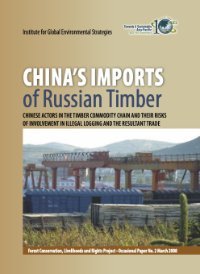China's Imports of Russian Timber: Chinese Actors in the Timber Commodity Chain and Their Risks of Involvement in Illegal Logging and the Resultant Trade
By Tian Yanfang
Since the end of the 1990s, the Sino-Russian border regions have witnessed a dramatic, unprecedented increase in cross-border timber trade that has made Russia the largest log supplier for China's expanding wood industry sector. Driving factors include: severe constraints in China's domestic wood supplies, the availability of rich forest resources in the Russian Far East and Siberia, liberalised trade policies and demand from both domestic and European, Japanese and US markets for low cost Chinese wood products. This study provides a contextual description and analysis of the cross-border timber trade boom and the actors involved. It examines the current challenges faced by a largely inefficient Russian forestry sector and decentralised Russian forest administration in the context of illegal logging and unsustainable forestry practices, both widely viewed as having reached serious dimensions.
This study focuses on the involvement and role of Chinese actors throughout the supply chain. Chinese companies have entered the Russian forestry sector, introduced greater efficiency and proved competitive. This involvement has also opened doors for Chinese actors to inadvertently or intentionally participate in illegal activities throughout the supply chain. In addition to timber harvesting, Chinese actors are involved as intermediaries in the commercial log depots and control the wholesale timber market in some parts of Russia. Chinese actors have also increasingly invested in wood processing in Russia, partly in response to the adjustment of the Russian export tax on logs. Most recently, there has been a trend towards vertical integration for Chinese companies, with intermediaries and wood importers attempting to extend their business to every node of the trading network. On the Chinese side of the border, preferential tax policies and infrastructure investment have spurred a rapid development of the timber processing industry with private sector processing mills replacing state-owned timber processing factories.
Hayama, Japan, Institute for Global Environmental Strategies, 2008. 58p.


